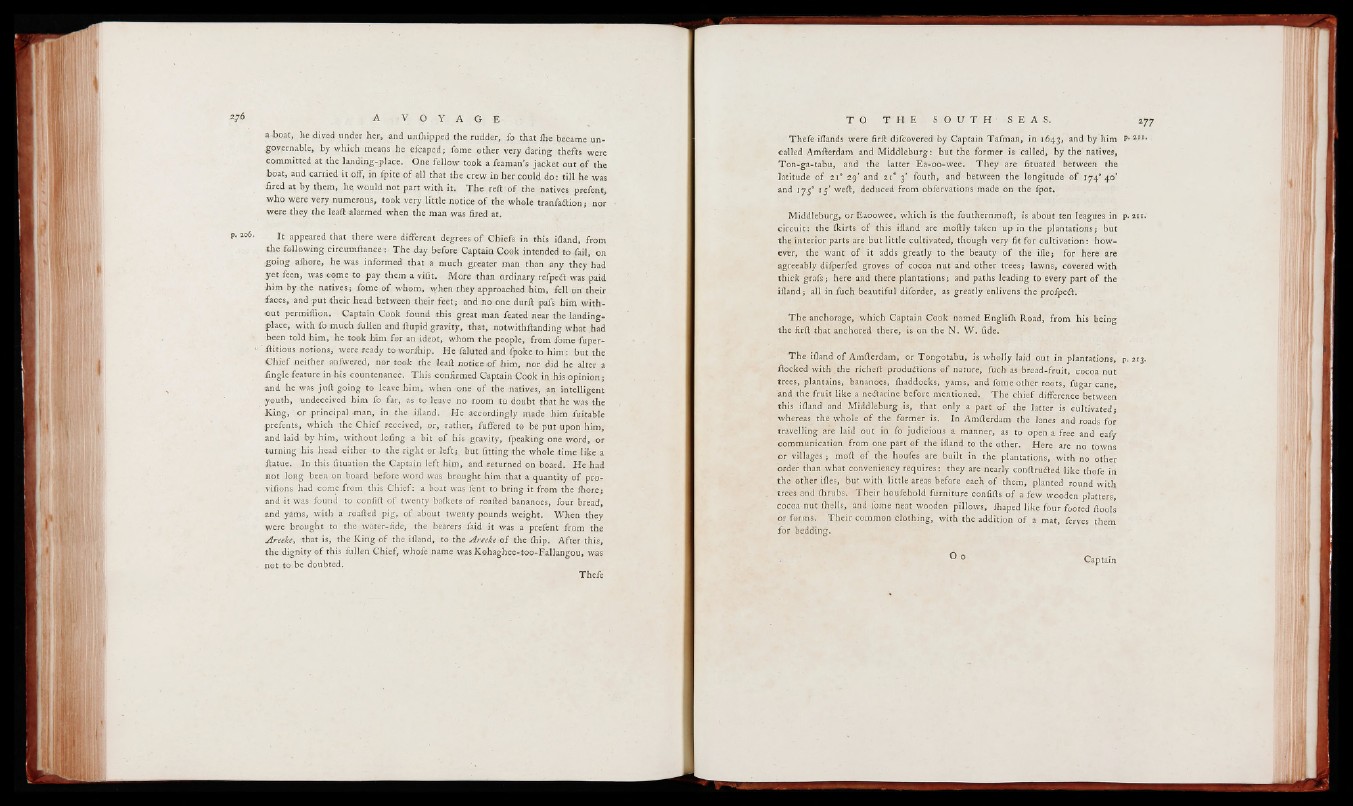
a boat, he dived under her, and unihipped the rudder,, fo that ihe became ungovernable,
by which means he efcaped; fome other very daring thefts were
committed at the landing-place. One fellow took a feaman’s jacket out of the
boat, and carried it off, in fpite of all that the crew in her could do : till he was
fired at by them, he would not part with it. The reft of the natives prefent,
who were very numerous, took very little notice of the whole tranfaäion; nor
were they the leaft alarmed when the man was fired at.
It appeared that there were different degrees of Chiefs in this illand, from
the following circumftance: The day before Captain Cook intended to fail, on
going aihore, he was informed that a much greater man than any they had
yet feen, was come to pay them a vifit. More than ordinary refpeft was paid
him by the natives; fome of whom, when they approached him, fell on'their
faces, and put their head between their feet; and no one dürft pafs him without
permifiion. Captain Cook found this great man feated near the landing-
place, with fo much füllen and ftupid gravity, that, notwithstanding what had
been told him, he took him for an ideof, whom the people, from fome fuper-
ftitioüs notions, were ready to worihip. He fainted and fpoke to him: but the
Chief neither anfwered, nor toofk the leaft notice him, nor did he alter a
fipgle feature in his countenance. This confirmed Captain Cook in his opinion;
and he was juft going to leave him, when one of the natives, an intelligent
•youth, undeceived him fo far, as to leave no room to doubt that he was the
King, ' or principal man, in the illand. He accordingly made him fuitable
prefents, which the Chief received, or, rather, fuffered to be put upon him,
and laid by him, without lofing a bit of his gravity, fpeaking one word, or
-turning his head either to the right or left;, but fitting the whole time like a
ftatue. In this fituation the Captain left him, and returned on board. He had
not long been on board before word was brought him that a quantity of pro-
vifions had come from this Chief: a boat was fent to bring it from the ihore;
and it was found to conlift of twenty baikets of roafted bananoes, four bread,
and yams, with ä roafted pig, of about twenty pounds weight. When they
were brought to the water-fide, the bearers faid it was a prefent from the
Areeke, that is, the King of the illand, to the Areeke of the ihip. After this,
the dignity of this füllen Chief, whofe name was Kohaghee-too-Fallangou, was
nut to be doubted.
Thefe
Thefe-illands were firft difcovered by Captain Tafman, in 1643, and by him
called Amfterdam and Middleburg: but the former is called, by the natives,
Ton-gl-tabu, and the latter Ea-oo-wee. They are lituated between the
latitude of 210 29’ and 210 3’ fouth, and between the longitude of i74°4o’
and i7_5° 15’ weft, deduced from obfervations made on the fpot.
Middleburg, or Eaoowee, which is the fouthernmoft, is about ten leagues in
circuit: the ikirts of this illand are moftly taken up in the plantations; but
the interior parts are but little cultivated, though very fit for cultivation: however,
the want of it adds greatly to the beauty of the ille; for here are
agreeably dilperfed groves of cocoa nut and other trees; lawns, covered with
thick grafs; here and there plantations; and paths leading to every part of the
illand; all in fuch beautiful diforder, as greatly enlivens the prolpedt.
The anchorage, which Captain Cook named Englilh Road, from his being
the firft that anchored there, is on the N. W. fide.
The illand of Amfterdam, or Tongotabu, is wholly laid out in plantations,
ftocked with , the richeft productions of nature, fuch as bread-fruit, cocoa nut
trees, plantains, bananoes, (haddocks, yams, and fome other roots, fugar cane,
and the fruit like a nedtarine before mentioned. The chief difference between
this illand apd Middleburg is, that only a part of the latter is cultivated-
whereas the whole o f the former is. In Amfterdam the lanes and roads for
travelling are laid out in fo judicious a manner, as to open a free and eafy
communication from one part of the illand to the other. Here are no towns
or villages; moft of the houfes are built in the plantations, with no other
order than what conveniency requires: they are nearly conftrudled like thofe in
the other illes, but with little areas before each of them, planted round with
trees and ihrubs. Their houfehold furniture confifts. o f a few wooden platters,
cocoa put ihell^and fome neat wooden pillows, ihaped like four footed ftools
or forms. Their common clothing, with the addition of a mat, ferves them
for bedding.
Captain